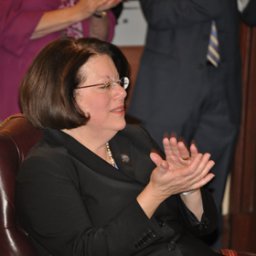TRENTON – Legislation sponsored by Senate Education Chair M. Teresa Ruiz and Senator Shirley K. Turner limiting expulsions and suspensions for students in preschool through grade 2 with certain exceptions was signed into law today.
Under the law, S-2081, students in kindergarten through second grade could not be expelled from school, except under limited circumstances. The law also prohibits out-of-school suspensions for students in kindergarten through second grade, except when the suspension is based on conduct that is of a violent or sexual nature that endangers others. In addition, the law prohibits all suspensions for preschool students and provides that preschool students may not be expelled, except under limited circumstances.
“Students who demonstrate behavioral problems at this early age need guidance and positive reinforcement, not punishment that takes them out of a structured learning environment,” said Senator Ruiz (D-Essex). “I want to thank the governor for taking action on this bill. This new law is intended to create a more supportive system that can help to address misbehavior in a productive way before it becomes a larger and more persistent problem.”
The law also requires school districts and charter schools to implement an early detection and prevention program to identify students in preschool through grade two who are experiencing behavioral or disciplinary problems, and provide behavioral supports for these students. An early detection and prevention program may be incorporated into the system of intervention and referral services that is required to be established in each school under current State Board of Education regulations at N.J.A.C.6A:16-8.1 to 8.2.
“Being outside of the school building does not provide constructive direction for children who are four, five and six years old,” said Senator Turner (D-Hunterdon/Mercer). “This law creates a new policy that will encourage a more compassionate and beneficial approach to handling behavioral problems when they occur within the school, rather than merely sending a child home without attempting to get to the root of the issue.”
A second law (S-496), sponsored by Senators Ruiz and Turner, requires that the state Commissioner of Education develop and establish an initiative to support and encourage school districts’ use of the Response to Intervention (RTI) framework to promote achievement among all students. Response to Intervention (RTI) is an approach to academic and behavioral intervention used to provide early, systematic, and appropriately intensive assistance to children who are at risk for or already underperforming as compared to appropriate grade- or age-level standards
“Making sure we are providing appropriate early intervention to students who demonstrate academic or behavioral challenges is critical to ensuring all students’ success,” said Senator Ruiz. “This law will create supports and training for school districts so that we are utilizing a researched-based approach to identifying areas where interventions are necessary, and that we have a framework in place for addressing them in the most effective way.”
“We want to ensure that children are learning at their fullest potential, and the best way to do that is to identify areas where they are struggling early on and to address them,” said Senator Turner. “This new law will provide districts and teachers with added tools to help students that are encountering difficulties and to give them the resources they need to be successful.”
The initiative would include the dissemination of information and guidance regarding: 1) the development and effective implementation of an RTI framework as a methodology for identifying struggling learners, maximizing student achievement, and reducing behavioral problems, and 2) the use of an RTI framework for identifying students with specific learning disabilities. The commissioner would also be responsible for providing technical assistance and training to school districts that are implementing an RTI framework, and ensuring that an RTI framework implemented by a school district includes certain elements.
S-2081 takes effect in the first full school year following the date of enactment; S-496 takes effect immediately.


